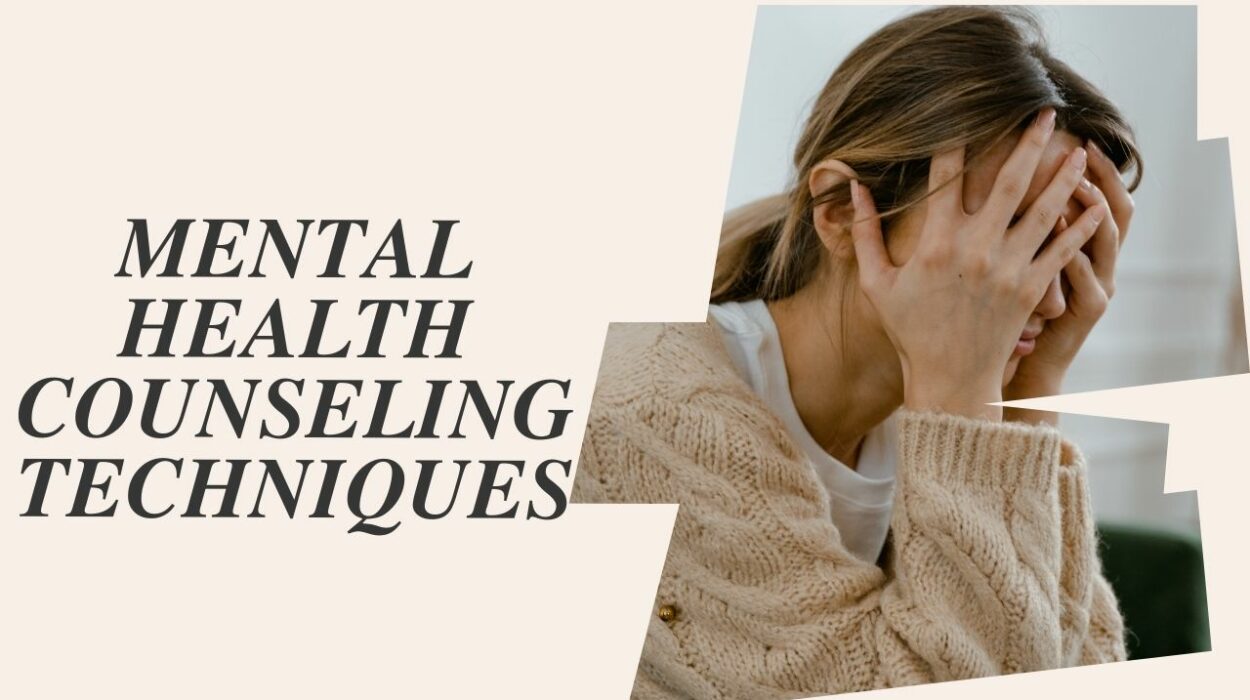Mental health counseling has become an integral part of improving well-being and helping individuals navigate life’s challenges. With various approaches available, choosing the right one depends on the individual’s needs and the counselor’s expertise. In this article, we’ll explore the top three mental health counseling techniques, shedding light on how they work and their benefits.
1. Cognitive Behavioral Therapy (CBT)
Cognitive Behavioral Therapy (CBT) is one of the most widely practiced counseling techniques and has a strong evidence base for its effectiveness. Developed in the 1960s by Dr. Aaron T. Beck, CBT focuses on identifying and changing negative thought patterns that influence emotions and behaviors.
How CBT Works
CBT operates on the principle that thoughts, feelings, and behaviors are interconnected. By changing unhelpful thought patterns, individuals can alter their emotional responses and actions. A typical CBT session involves:
- Identifying Negative Thoughts: The counselor helps the client recognize distorted or irrational thinking patterns.
- Challenging These Thoughts: The client is encouraged to question the validity of these thoughts and consider alternative perspectives.
- Behavioral Experiments: Clients test new behaviors in real-life situations to reinforce positive change.
Applications of CBT
CBT is effective in treating a variety of mental health issues, including:
- Anxiety disorders
- Depression
- Post-Traumatic Stress Disorder (PTSD)
- Eating disorders
- Substance abuse
Benefits of CBT
- Structured and goal-oriented
- Short-term and time-efficient (typically 12-20 sessions)
- Skills learned can be applied independently
2. Mindfulness-Based Stress Reduction (MBSR)
Mindfulness-Based Stress Reduction (MBSR) is a therapeutic approach that combines mindfulness meditation with principles of stress management. Developed by Dr. Jon Kabat-Zinn in 1979, MBSR aims to help individuals become more present and aware, reducing stress and improving overall mental health.
How MBSR Works
MBSR teaches individuals to focus on the present moment without judgment. Key components include:
- Mindfulness Meditation: Practicing meditation to develop awareness of thoughts, emotions, and bodily sensations.
- Body Scan Exercises: Systematically paying attention to different parts of the body to promote relaxation.
- Yoga and Gentle Movement: Integrating physical activities to enhance body awareness and reduce tension.
Applications of MBSR
MBSR has shown to be effective in addressing:
- Chronic stress
- Anxiety
- Depression
- Chronic pain
- Insomnia
Benefits of MBSR
- Non-invasive and accessible
- Enhances emotional regulation
- Improves focus and concentration
- Can be practiced individually or in group settings
3. Person-Centered Therapy (PCT)
Person-Centered Therapy (PCT), also known as Rogerian therapy, was developed by Carl Rogers in the 1940s. This humanistic approach emphasizes the importance of a supportive environment where clients feel free to explore their thoughts and feelings.
How PCT Works
PCT operates on the belief that individuals have an innate ability to achieve personal growth and self-actualization. Key elements include:
- Unconditional Positive Regard: Counselors accept clients without judgment, fostering trust and openness.
- Empathy: Demonstrating understanding and validating the client’s experiences.
- Congruence: Being genuine and authentic in the therapeutic relationship.
Applications of PCT
This approach is beneficial for individuals experiencing:
- Low self-esteem
- Relationship issues
- Life transitions
- Grief and loss
- Stress
Benefits of PCT
- Client-centered and empowering
- Encourages self-discovery and personal growth
- Fosters a safe and supportive environment
Choosing the Right Counseling Technique
Selecting the appropriate mental health counseling approach depends on various factors, including the client’s specific needs, goals, and preferences. It’s also essential to consider the counselor’s expertise and the evidence supporting a particular method for the issue at hand.
Questions to Ask When Choosing a Technique
- What are my primary mental health concerns?
- What are my goals for therapy?
- Do I prefer a structured approach (like CBT) or a more open-ended one (like PCT)?
- Am I interested in incorporating mindfulness practices into my routine?
The Role of the Counselor
A qualified mental health counselor plays a crucial role in guiding clients through their therapeutic journey. They assess individual needs, tailor interventions, and provide ongoing support. Building a strong therapeutic alliance is critical for achieving positive outcomes.
Also Read: How to Use Your Fitness Tracker to Crush Your Fitness Goals
Final Thoughts
Mental health counseling offers a range of effective techniques to support individuals on their path to well-being. Cognitive Behavioral Therapy, Mindfulness-Based Stress Reduction, and Person-Centered Therapy each provide unique approaches to address diverse mental health concerns. By understanding these methods, individuals can make informed decisions about their mental health care.
Remember, seeking help is a sign of strength. Whether you’re managing stress, coping with a mental health condition, or striving for personal growth, these techniques can provide the tools and support needed to thrive.
